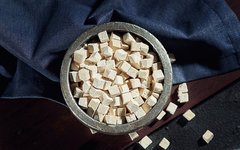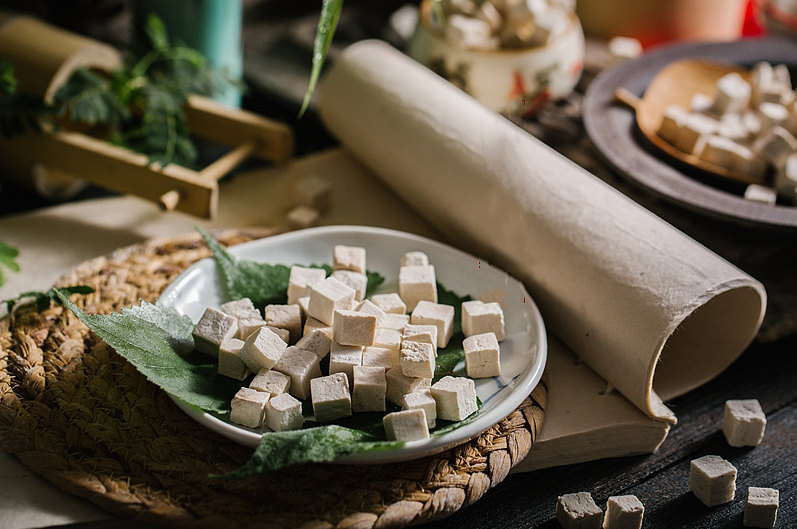


Poria (Fu Ling) is sweet and bland, with a neutral nature, nourishing without being greasy, and diuretic without being harsh. It is known as the “Divine Medicine of All Seasons” because it can be used throughout the year, effectively addressing various ailments related to cold, heat, wind, and dampness when combined with other herbs.
The effects of Poria can be summarized in three main aspects.


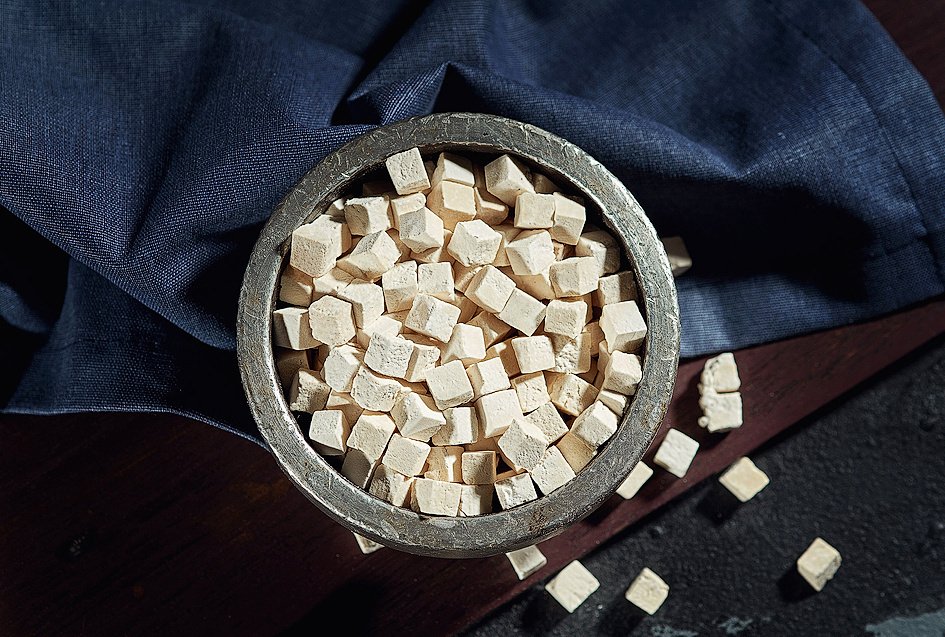
1. Poria has a diuretic and damp-draining effect, making it beneficial for those with excessive dampness who can drink Poria water.
Individuals with heavy dampness typically have a swollen tongue with teeth marks (most of these marks are formed due to the tongue being pressed by the teeth), and a thick, greasy tongue coating.
In TCM, it is said that “heavy dampness feels like being wrapped up”; this sensation is the body’s response to dampness, akin to wearing a shirt that has not dried after washing, leading to feelings of soreness, weakness, and reluctance to move.
Skin tends to be oily, and hair can also become greasy. Oily skin is the body’s way of secreting oil to moisturize and protect the skin. However, excessive oil secretion can lead to a shiny face shortly after washing, which can be bothersome.
Excessive oil secretion from hair follicles can lead to seborrheic alopecia, which is a significant concern.
Poria grows in association with the roots of pine trees. Experienced herbalists harvest wild Poria by focusing on pine trees that show signs of wilting or decay. If the surrounding ground is relatively dry with little undergrowth, and irregular cracks (i.e., fissures) are visible, tapping or stepping on the ground in this area produces a hollow sound, indicating the presence of harvestable Poria below. Why is Poria often found in such areas? It is because Poria drains dampness, and the surrounding environment where it grows is not overly damp.
The Huang Di Nei Jing states: “Turbid yin exits through the lower orifices.” The water and dampness that cannot be metabolized in the body is termed turbid yin. Turbid yin should normally be expelled through the digestive tract, but when there is a problem with the body’s fluid metabolism, turbid yin can rise, leading to hair loss. This is analogous to overwatering a potted plant, where poor drainage causes the roots to rot.
Poria, being sweet and bland, drains dampness and promotes urination, allowing water to descend. When the dampness is eliminated, the clear yang can rise, thus promoting healthy hair growth.
The late renowned TCM expert, Mr. Yue Meizhong, successfully treated a young man’s hair loss using only Poria.
A 21-year-old man named Xu suffered from alopecia areata, with a walnut-sized bald spot on the top of his head that gradually expanded. Many observers believed this condition was difficult to cure, leading him to feel frustrated and depressed. Mr. Yue found his pulse to be soft and observed a white tongue without other complaints. He prescribed a decoction of Poria, specifically 500-1000g of Poria ground into a fine powder, to be taken at 6g per dose with boiled water, twice a day. He advised the patient to continue taking it for a considerable period until hair regrowth was achieved. After about two months of treatment, the patient returned for a follow-up, and his hair had grown back significantly, nearly fully recovered. Mr. Yue also recalled that the patient’s father had experienced similar hair loss at the age of ten, which was also treated with Poria, resulting in hair regrowth after three months.
For hair loss caused by dampness rising, drinking Poria water is also effective.
In TCM, this condition can be caused by various factors such as blood heat generating wind, blood deficiency leading to wind dryness, damp-heat rising, kidney essence deficiency, qi and blood deficiency, and heart-spleen deficiency. The Poria decoction is effective for hair loss caused by dampness rising, while other types of hair loss require differential diagnosis and treatment.
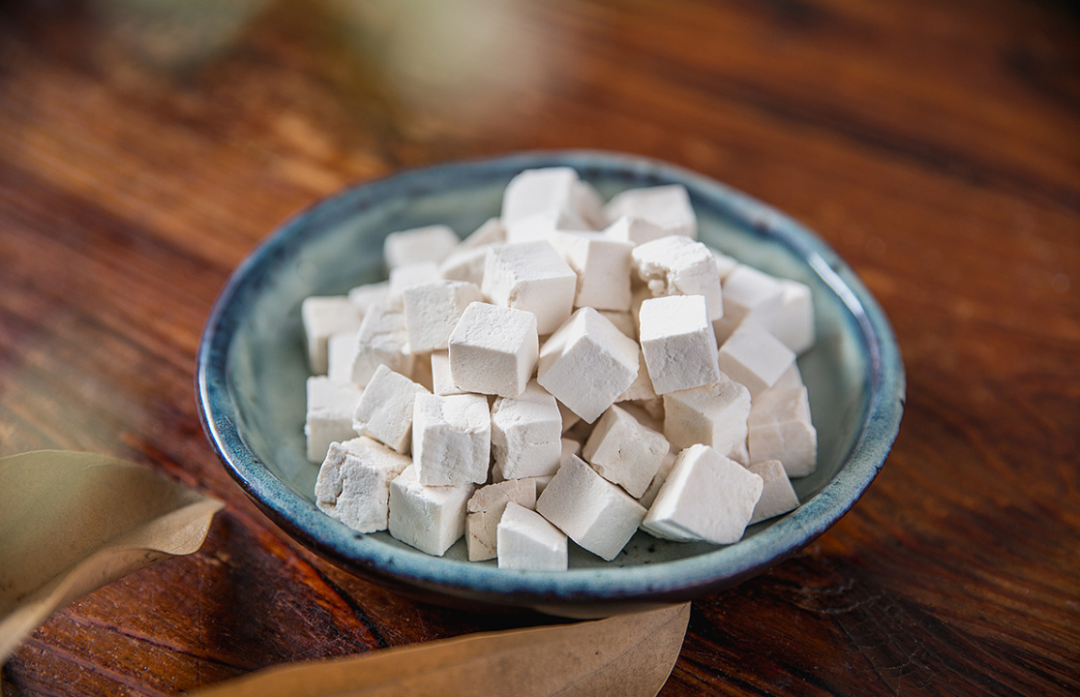
2. The second effect of Poria is to strengthen the spleen.
Modern individuals consume a lot of cold and cool foods. The intake of rich and heavy flavors far exceeds the body’s needs, placing a heavy burden on the spleen’s transport and transformation functions. Over time, the spleen becomes overworked, damaging its yang, leading to its dysfunction.
Objectively speaking, Poria’s ability to strengthen the spleen is not as strong as that of ginseng or Bai Zhu (Atractylodes macrocephala), but Poria can both strengthen the spleen and drain dampness, and its mild nature allows for long-term use to strengthen the spleen and eliminate dampness, thus regulating the body.
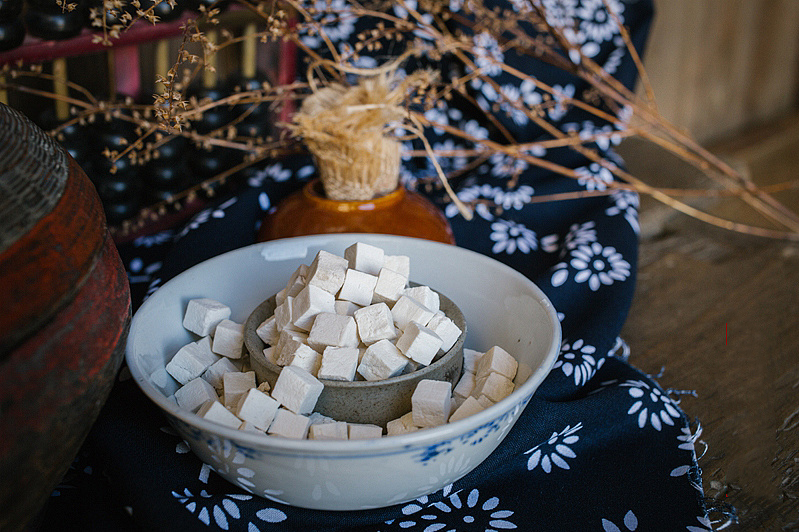
3. Poria also has a calming and tranquilizing effect on the mind.
In TCM, each of the five organs houses its corresponding spirit, known as the five organ spirits: the heart corresponds to the spirit, the liver to the soul, the spleen to the intention, the lungs to the will, and the kidneys to the essence.
When the heart spirit is disturbed, it manifests as palpitations, where one can feel their heart beating without any vigorous exercise or fright. In addition to palpitations, symptoms such as insomnia, vivid dreams, forgetfulness, and irritability fall under the category of disturbed heart spirit.
In summary, the article discusses the various properties and benefits of Poria (Fu Ling) in Traditional Chinese Medicine, emphasizing its role in draining dampness, strengthening the spleen, and calming the mind. It highlights the importance of Poria in treating conditions related to dampness and its historical use in TCM.

